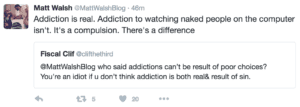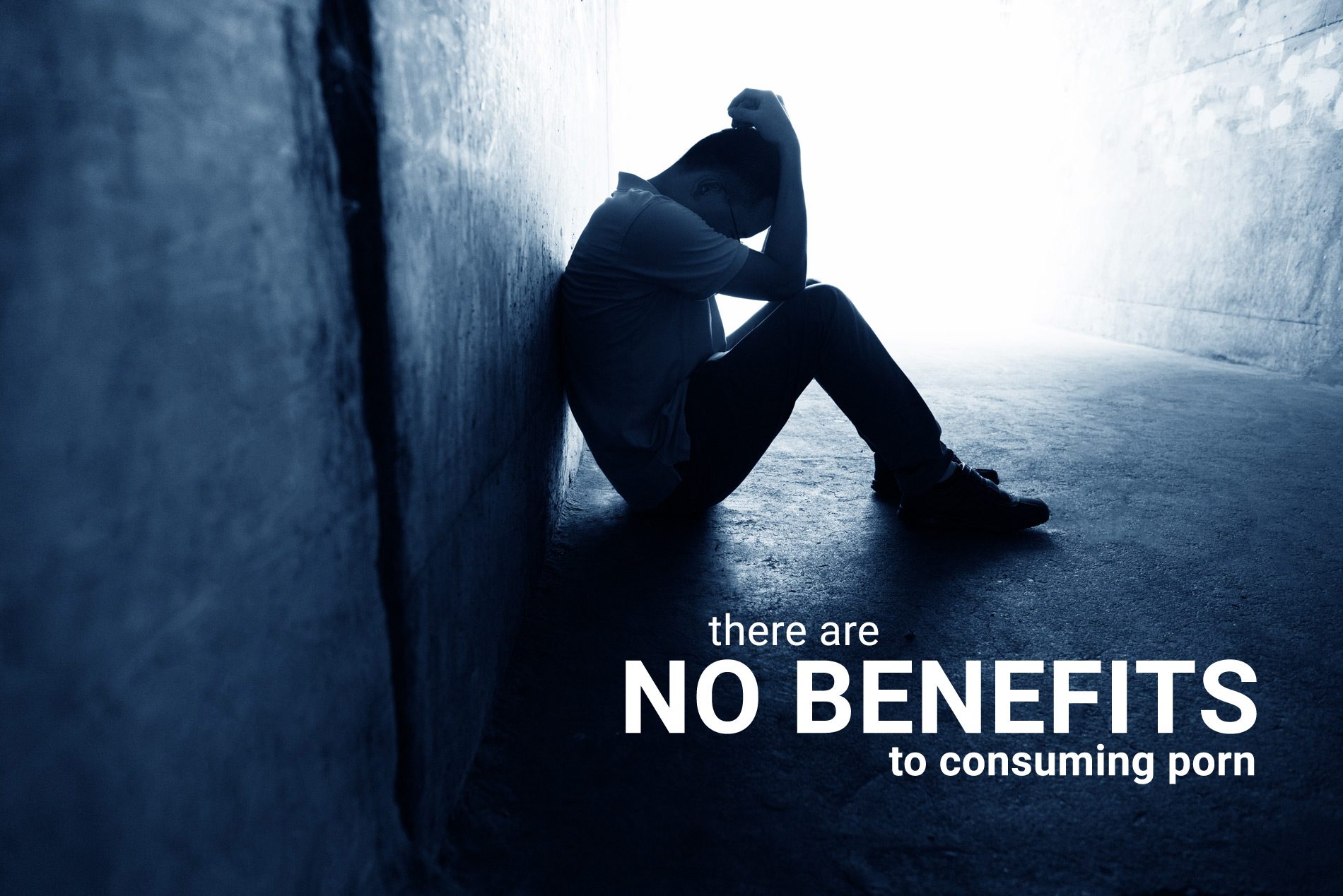Wait, People Are Now Saying Porn Isn’t An Addiction?

About every week I will receive a text or email from someone asking me to respond to a recent article that claims to debunk porn addiction.
Here are a few such articles: Your Porn Addiction Isn’t Real, Your Brain on Porn – It’s NOT Addictive, Is ‘porn addiction’ a real thing?, There’s No Such Thing As Porn Addiction, Says New Research, New Research Suggests Porn is NOT an Addiction. It is a Compulsion. Here’s Why That Matters. Or the latest, Porn addiction: The Christian right’s latest quack crusade is no excuse for trading in child pornography. I would give many more examples except that the images in those posts are sexually explicit.
*Side note: As I was writing this article I got sent a text informing me that Matt Walsh, a popular Catholic blogger, is saying porn isn’t addictive:
Ah, it’s a fun job. 🙂
Okay, here’s the deal. Each and every one of those articles, as well as the ones I keep getting asked to respond to all have one thing in common: They cite one of the two Nicole Prause EEG studies, which claim to debunk porn addiction.
Why is that a problem? Because both of Prause’s EEG studies actually support the existence of porn addiction! Why do I say that?
In her 2013 EEG study (which had no control group) she found that individuals with greater cue reactivity to porn had less desire for sex with a partner – but not lower desire to masturbate to porn. According to Cambridge researcher Valerie Voon, this finding is in line with Voon’s 2014 brain study, which found hard evidence of porn addiction in problematic porn users.
In Prause’s 2015 EEG study, her team found desensitization in the heavy porn users, which is an indication of a blunted response to pleasure, common in addicts. In scientific research there are data, and then there are conclusions. Top neuroscientists clearly interpret Prause’s data differently from the way she does. See below.
Gary Wilson from YourBrainOnPorn, writes:
Nicole Prause “claims these results debunk porn addiction. However, these findings [the 2015 EEG study] align perfectly with Kühn & Gallinat (2014), which found that more porn use correlated with lower brain activation in response to pictures of vanilla porn (and less gray matter in the dorsal striatum). In other words, “porn addicts” were desensitized and needed greater stimulation than non-addicts.”
And in case you’re thinking, “what does Gary Wilson know, that’s just one guy!” Multiple peer-reviewed papers agree with his analysis. All of them agree that what Prause actually found is consistent with the effects of addiction in her studies’ subjects.
With respect to her 2015 study Prause et al. see these five papers.
- Neuroscience of Internet Pornography Addiction: A Review and Update (2015)
- Decreased LPP for sexual images in problematic pornography users may be consistent with addiction models. Everything depends on the model (2016)
- Neurobiology of Compulsive Sexual Behavior: Emerging Science (2016)
- Should compulsive sexual behavior be considered an addiction? (2016)
- Is Internet Pornography Causing Sexual Dysfunctions? A Review with Clinical Reports (2016)
Peer-reviewed papers have also discredited her claims in the press about porn made in an earlier study that she co-authored. Steele et al., 2013:
- ‘High Desire’, or ‘Merely’ An Addiction? A Response to Steele et al. (2014), by Donald L. Hilton, Jr., MD
- Neural Correlates of Sexual Cue Reactivity in Individuals with and without Compulsive Sexual Behaviours (2014), by Valerie Voon,Thomas B. Mole, Paula Banca, Laura Porter, Laurel Morris, Simon Mitchell, Tatyana R. Lapa, Judy Karr, Neil A. Harrison, Marc N. Potenza, and Michael Irvine
- Neuroscience of Internet Pornography Addiction: A Review and Update (2015), by Todd Love, Christian Laier, Matthias Brand, Linda Hatch & Raju Hajela
- Is Internet Pornography Causing Sexual Dysfunctions? A Review with Clinical Reports (2016)
Prause’s studies show that while science may be unbiased, scientists are not. Her former Twitter phrase is a case in point: “Studying why people choose to engage in sexual behaviors without invoking addiction nonsense”.
Want to learn more about how to detect biased articles? Click here. On that same page you will find all the studies (26 in total, including Prause’s 2 EEG studies) assessing the brain structure and functioning of Internet porn users. Wilson says, “to date every brain study offers support for the porn addiction model. The results of these 26 studies (and upcoming studies) are consistent with 160+ Internet addiction brain studies, many of which also include internet porn use. All support the premise that internet porn use can cause addiction-related brain changes, as do recent neuroscience-based reviews of the literature.”
So the next time you see an article claiming to debunk porn addiction, you might begin by opening the article, using the Ctrlcommand+F keyboard shortcut and typing “Prause.” Chances are her heavily criticized work will be cited while the non-Prause neurological studies linked to above will be omitted.
If you’re interested, here are a couple videos I created on the topic for you to share:













Thanks for this explanation about the research in this fractious field. The academics most often cited in the popular press seem to be far behind the reality.